What is your academic background and current affiliation?
I’m a second-year undergraduate student at Northwestern, and I’m majoring in Biological Sciences and Science in Human Culture. I’m also on the pre-med track and a part of the Honors Program in Medical Education (HPME).
What are your current research interests?
I’m interested in researching health disparities among various racial and ethnic groups, particularly disparities that have resulted from structural racism and oppression. I’m also interested in investigating how we can address these disparities to advance health equity.
What excites you about your research field?
I’m really excited about how we can translate research into policy to create systemic change to alleviate suffering and promote well-being on a grand scale.
What are two important take-home points from your research?
The heterogeneity within the Asian American population really struck me. As much as we are characterized and perceived as a monolithic group, we are not, and these differences need to be acknowledged not only in research, but in society more largely.
While each racial and ethnic group suffers from health disparities, each group also has its own strength and resilience, which we can draw on in various ways to alleviate these burdens.
How does your work support community priorities and health equity?
My research is about how social networks affect cardiovascular health in the Asian American population, which experiences considerable cardiovascular disease disparities. My work advances health equity by aiming to find ways, such as interventions that draw on social networks, to alleviate this disease burden.
How did you identify your mentor?
When I was trying to find a mentor, I read through various Feinberg faculty members’ descriptions and research interests. Dr. Kandula’s focus on centering communities and her interdisciplinary approach resonated with many themes from my coursework. When I talked to her more, her current projects about interventions that involve family members excited me because of my own close family relationships.
What is the most valuable piece of advice you have received from a mentor?
Take care of yourself and take breaks! Our society is so focused on efficiency and production that we often forget to check in with ourselves. It’s so important to keep a balance to keep ourselves healthy and also to do what makes us happy.
What are key tips and tricks to maintaining "mentor-mentee" relationships from your experience?
I think it’s really important for mentors and mentees to get to know each other and be able to develop some kind of a personal connection. I find that connecting based on common interests and fostering an open dialogue can help build mutual respect. It also makes mentees feel comfortable asking questions and can sustain the relationship.
What is your favorite thing to do when you are not working?
I love to play tennis with friends!

